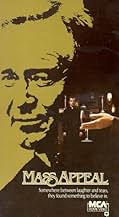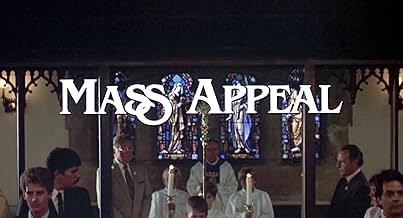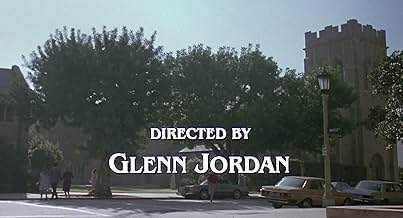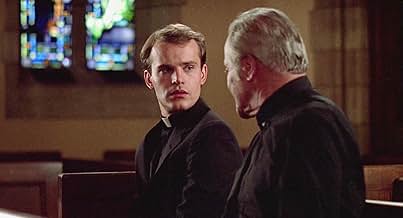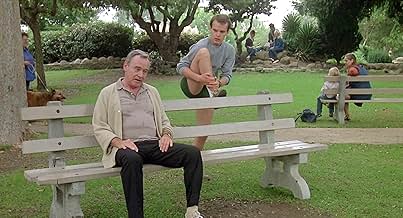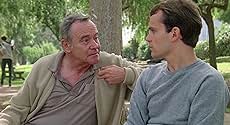VALUTAZIONE IMDb
6,7/10
1185
LA TUA VALUTAZIONE
Aggiungi una trama nella tua linguaA popular Connecticut priest shields a seminary rebel from the wrath of a stern monsignor.A popular Connecticut priest shields a seminary rebel from the wrath of a stern monsignor.A popular Connecticut priest shields a seminary rebel from the wrath of a stern monsignor.
- Premi
- 1 vittoria in totale
Recensioni in evidenza
Mark Dolson (Zeljko Ivanek) wants to be a priest because, as a child, someone boiled his goldfish. The alternate version is as uninspired - because he does not find fulfillment in intimate relationships with either sex, he is qualified for the priesthood. At any rate, he says that he wants `to help people.' A bit of a loose cannon, Dolson is sent by the Monsignor to serve as deacon for the now jaded Father Farley (Jack Lemmon).
What ever his faults may be, Dolson is impassioned. He wants to make a difference. The problem is that it is unclear as to whether the priesthood is the place for him to do it. As a vehicle for exploring the question of gays (or women for that matter) in the Roman Catholic priesthood, Mass Appeal is lacking because of this lack of clarity.
His lack of a clear `call' is foregrounded by his lackluster attempts at sermons. All Mark knows is that he wants to move people. He is uncertain about where his congregation is, or where he wants to move them. Farley steps in to suggest that he go for beloved. Hence the play on words in the title. Farley wants Mark to gain Mass Appeal by making the Mass appealing: if someone finds God in the process, hey that's ok too. Dolson will have none of this and founders.
Farley's appeal is that he knows the system. One gets the impression that he wants someone to rock the boat. Of course the irony of the situation is that in order to shake up the system, one must first join it.
Does this film have a meaning or a message? Well yeah, it does. But that is something for each viewer to figure out for him or herself. It won't make you hate or love the church (any church this one just happens to be Roman Catholic). Did I like the film? Yes. Is it my favorite? No not even close. It is a study of idiosyncrasies and harmless little lies (`I didn't know there was such a thing,' says Dolan). Jack Lemmon is in it for goodness sake, what else could you want?
What ever his faults may be, Dolson is impassioned. He wants to make a difference. The problem is that it is unclear as to whether the priesthood is the place for him to do it. As a vehicle for exploring the question of gays (or women for that matter) in the Roman Catholic priesthood, Mass Appeal is lacking because of this lack of clarity.
His lack of a clear `call' is foregrounded by his lackluster attempts at sermons. All Mark knows is that he wants to move people. He is uncertain about where his congregation is, or where he wants to move them. Farley steps in to suggest that he go for beloved. Hence the play on words in the title. Farley wants Mark to gain Mass Appeal by making the Mass appealing: if someone finds God in the process, hey that's ok too. Dolson will have none of this and founders.
Farley's appeal is that he knows the system. One gets the impression that he wants someone to rock the boat. Of course the irony of the situation is that in order to shake up the system, one must first join it.
Does this film have a meaning or a message? Well yeah, it does. But that is something for each viewer to figure out for him or herself. It won't make you hate or love the church (any church this one just happens to be Roman Catholic). Did I like the film? Yes. Is it my favorite? No not even close. It is a study of idiosyncrasies and harmless little lies (`I didn't know there was such a thing,' says Dolan). Jack Lemmon is in it for goodness sake, what else could you want?
Pity the poor congregation of St. Francis Parish, subject to "dialogue sermons" (what???), autobiographical psycho-babble and in the end, self-righteous calls to rise up against the local Church hierarchy. If things are really like this in the Catholic Church today, its enough to make this lapsed Catholic stay that way for a long time. That said, and hoping that this does not mirror reality, the movie works as entertainment, largely due to the performances of the two main characters. Jack Lemmon is delightful and convincing as a lonely priest who has found strategies (some decent ones, some hurtful) to survive who takes on the task of mentoring and tempering the well-meaning but naive passions of a young seminarian, also well played. The big casualty is in the one-dimensionality of the "heavy" played by Charles Durning, and perhaps of all of his cronies as well. Well, Catholic bashing is nothing new, mostly by ex-Catholics, but it always diminishes the dialogue such issues could provoke. However, there is more to the movie than this, especially in some very good characterizations of Catholic lay people, Louise Latham's housekeeper in particular.
The Catholic Church is as much, if not more, political than it is spiritual. As a young Catholic boy considering the priesthood yet conflicted between my own feelings and myself and that which the Church demanded, in the end I decided to go to high school instead of entering the Seminary.
I saw this movie as a young lay man. There was such a resonance for me as a Catholic and as a young man struggling with the Church, sexuality, and spirituality.
The pastor (Lemmon) was very much the pastor of a parish that was part of my experience. As much as he was devoted to his calling, he was also responsible for the political games that are played in everyone's life. The young seminarian (Ivenek) was honest, open and young with new ideas; everything the Church wanted to suppress.
The pastor wanted nothing more than to continue his comfortable position in his parish. He was assigned a new priest-to-be who had shown himself to be a bit of a radical at the seminary. It's not to be ignored the "office politics" that were in place in the assignment.
The elder was being punished and tested, so to speak, with the assignment of this younger priest. He did his best to impose his wisdom on the younger; but the younger sought spirituality more than acceptance of the status quo. In other words, he ruffled parishioners' feathers.
When complaints were lodged about this young radical priest, his sexuality came into question. What those "powers that be" were concerned about was this young priest's sermons and indictments of false spirituality dressed up as devotion. After all, if the Church had ever really been concerned with sexuality, there'd not have been a molestation of any alter boy.
This film shows how the Church picks and chooses who to persecute. Persecution of the parish priest for not playing the political games, persecution of the young seminarian who desires to spread the Word of God.
It also indicts us as parishioners. Do we go to church to be told what we want to hear or are we there to hear God's truth? Should our contributions to the collection plate influence what we hear; or should the Word of God actually mean something? This is a memorable movie in that it makes us think about what brings us to Church.
I saw this movie as a young lay man. There was such a resonance for me as a Catholic and as a young man struggling with the Church, sexuality, and spirituality.
The pastor (Lemmon) was very much the pastor of a parish that was part of my experience. As much as he was devoted to his calling, he was also responsible for the political games that are played in everyone's life. The young seminarian (Ivenek) was honest, open and young with new ideas; everything the Church wanted to suppress.
The pastor wanted nothing more than to continue his comfortable position in his parish. He was assigned a new priest-to-be who had shown himself to be a bit of a radical at the seminary. It's not to be ignored the "office politics" that were in place in the assignment.
The elder was being punished and tested, so to speak, with the assignment of this younger priest. He did his best to impose his wisdom on the younger; but the younger sought spirituality more than acceptance of the status quo. In other words, he ruffled parishioners' feathers.
When complaints were lodged about this young radical priest, his sexuality came into question. What those "powers that be" were concerned about was this young priest's sermons and indictments of false spirituality dressed up as devotion. After all, if the Church had ever really been concerned with sexuality, there'd not have been a molestation of any alter boy.
This film shows how the Church picks and chooses who to persecute. Persecution of the parish priest for not playing the political games, persecution of the young seminarian who desires to spread the Word of God.
It also indicts us as parishioners. Do we go to church to be told what we want to hear or are we there to hear God's truth? Should our contributions to the collection plate influence what we hear; or should the Word of God actually mean something? This is a memorable movie in that it makes us think about what brings us to Church.
"Mass Appeal" is enjoyable on several levels. It works as an examination of the depth of contemporary religious beliefs and their current role in our society, as an indictment of an inflexible system (the Catholic church), and as a comment on the travails of two very different men (ostensibly of the same "cloth") seeking spiritual happiness. Unfortunately, as a "mass appeal" film, not all of the issues are satisfactorily handled, but the film is entertaining nonetheless. Greg Cundiff's excellent review neatly summarizes some key plot issues and holes. For example, I found Ivanek's/Dolson's devotion and desire compelling, but what on earth would make him think that a parish of strangers would listen to his excoriations and then embrace him as their pastor? I agree with Cundiff that the lack of clarity surrounding this fundamental plot point does not help the film. I was also disappointed that Durning's character was unambiguously drawn as the heavy. A more balanced approach may have helped here. Farley's attempt at leading a discussion of the role of women priests is unusually framed, but ultimately leaves the viewer desiring a more compelling resolution to the issue.
Strongly on the plus side, Lemmon is an excellent choice for the lead (whi ch allows him to display his comic and dramatic talents equally). Farley's story is as compelling as Dolson's, and Lemmon squeezes every drop of drama from the script. His final "mass appeal" is quite affecting. Ivanek is intense as Dolson, but Charles Durning's role could be played by anyone. The film is nicely "shot" and has an exhilarating soundtrack at points.
A "7" out of "10."
Strongly on the plus side, Lemmon is an excellent choice for the lead (whi ch allows him to display his comic and dramatic talents equally). Farley's story is as compelling as Dolson's, and Lemmon squeezes every drop of drama from the script. His final "mass appeal" is quite affecting. Ivanek is intense as Dolson, but Charles Durning's role could be played by anyone. The film is nicely "shot" and has an exhilarating soundtrack at points.
A "7" out of "10."
Given all the revelations of sex abuse in the Catholic Church, Mass Appeal in its
own way is as dated as Going My Way in its picture of the Catholic Church and its
inner workings. Still the relationship of Jack Lemmon and Zeljko Ivanek isn't
exactly Bing Crosby and Barry Fitzgerald.
Playwright Bill C. Davis was hired to expand for the screen his two person play which 212 performances on Broadway in the 1981-82 season. It would hardly do to fill 100+ minutes of screen time with two priests just talking. Still the main focus is on popular parish priest Jack Lemmon and Zeljko Ivanek who is quite the oddball rebel at the seminary.
The monsignor in charge of the seminary Charles Durning wants Lemmon to take this kid in hand and explain the facts of life to him otherwise his ambition to be a priest will never be fulfilled. But as these two go back and forth one starts to wonder who is changing who.
On stage it worked to have the forces of repression as Ivanek sees them just be in the abstract. But for the screen Durning's role is critical in that the audience has to have the forces of oppression be personalized. Otherwise it would not have worked.
What the issues are I won't reveal, but as I said the sex abuse scandals have really dated Mass Appeal. Still it's a fine film with great performances from Lemmon, Ivanek, and Durning.
Playwright Bill C. Davis was hired to expand for the screen his two person play which 212 performances on Broadway in the 1981-82 season. It would hardly do to fill 100+ minutes of screen time with two priests just talking. Still the main focus is on popular parish priest Jack Lemmon and Zeljko Ivanek who is quite the oddball rebel at the seminary.
The monsignor in charge of the seminary Charles Durning wants Lemmon to take this kid in hand and explain the facts of life to him otherwise his ambition to be a priest will never be fulfilled. But as these two go back and forth one starts to wonder who is changing who.
On stage it worked to have the forces of repression as Ivanek sees them just be in the abstract. But for the screen Durning's role is critical in that the audience has to have the forces of oppression be personalized. Otherwise it would not have worked.
What the issues are I won't reveal, but as I said the sex abuse scandals have really dated Mass Appeal. Still it's a fine film with great performances from Lemmon, Ivanek, and Durning.
Lo sapevi?
- QuizAccording to actor Zeljko Ivanek, the fish sermon scene was shot 15 times from three different angles. Although Ivanek considers the last take the best, most of it didn't make the final cut because it was too emotionally jarring for the audience.
- Citazioni
Father Tim Farley: You're a lunatic! And Christ NEEDS lunatics. But the trouble with lunatics is, they don't know how to survive.
- Curiosità sui creditiThis picture is dedicated to the memory of Ray A. Kroc.
- ConnessioniFeatured in At the Movies: Dune/Starman/Mass Appeal/Runaway (1984)
I più visti
Accedi per valutare e creare un elenco di titoli salvati per ottenere consigli personalizzati
- How long is Mass Appeal?Powered by Alexa
Dettagli
- Data di uscita
- Paese di origine
- Lingua
- Celebre anche come
- Die Auseinandersetzung
- Luoghi delle riprese
- Claremont, California, Stati Uniti(myself, as I was an extra in this film)
- Aziende produttrici
- Vedi altri crediti dell’azienda su IMDbPro
Botteghino
- Budget
- 7.000.000 USD (previsto)
- Lordo Stati Uniti e Canada
- 1.945.658 USD
- Lordo in tutto il mondo
- 1.945.658 USD
Contribuisci a questa pagina
Suggerisci una modifica o aggiungi i contenuti mancanti


